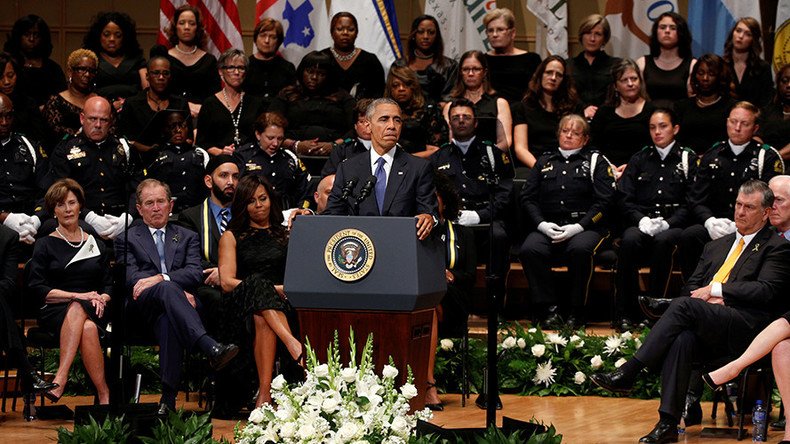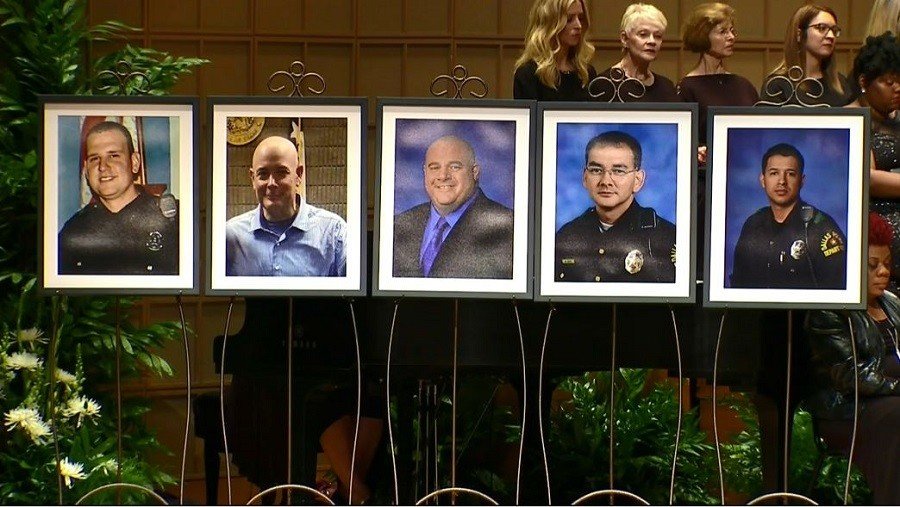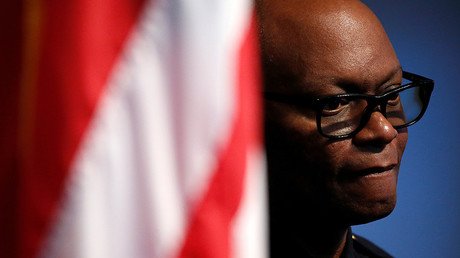'Not just demented violence, but racial hatred' ‒ Obama on Dallas attacks

President Barack Obama and former President George W. Bush spoke at the interfaith memorial service for the five Dallas, Texas police officers killed in an ambush at a march against police brutality.
On Tuesday, five days after police were ambushed at a march in downtown Dallas, a memorial service was held at the Morton H. Meyerson Symphony Center for the five officers who died in the attack: Lorne Ahrens, Michael Krol, Michael Smith, Brent Thompson, and Patrick Zamarripa. Nine other officers from three different police forces were injured in the shooting.
First Lady Michelle Obama, former First Lady Laura Bush, Vice President Joe Biden and Second Lady Dr. Jill Biden were all in attendance as well. The Bushes make their home in Dallas.
Dallas Mayor Michael Rawlings was the first to speak.
“Dallas’ pain is a national pain,” Rawlings said, welcoming the president, former president, vice president and their wives.
Reverend Sheron Patterson of the United Methodist Church of North Texas, Imam Omar Suleiman of the Valley Ranch Islamic Center and Rabbi Andrew Marc Paley of Temple Shalom Dallas offered prayers and comfort to the mourners. They all wore a yellow, navy and black striped solidarity ribbon over their shoulders.
Senator John Cornyn (R-Texas) called the slain officers “men of uncommon courage” who “overcame evil” through their actions the night of the ambush.
“Today, our family and this great nation shares the grief of Dallas,” he said.

Cornyn then introduced Bush to eulogize the officers who were killed in “an ambush of hatred and malice.”
“Today the nation grieves, but those of us who love Dallas and call it home have had five deaths in the family,” Bush began. “Laura and I see members of law enforcement everyday. We count them as our friends. And we know, like for every other American, their courage is our protection and shield.”
Bush offered a moment of levity when discussing Zamarripa, noting he was a “loyal Texas Ranger fan.” The former president once owned the baseball team.
Rawlings then took to the podium again to thank Dallas Area Rapid Transit (DART) Police Chief James ‘J.D.’ Spiller and Dallas Police Chief David Brown ‒ who received a standing ovation from attendees ‒ for their leadership and dedication after losing officers under their command.
Rawlings introduced Brown as “my rock,” and as someone who represents not only Dallas but police officers and chiefs across the country.
“There is no greater love than this, that these five men gave their lives for all of us,” Brown said before introducing Obama.
The president began with another moment of levity, telling Brown, “I’m so glad I met Michelle first because she loves Stevie Wonder,” referring to the police chief’s quoting of Wonder’s song ‘I’ll Be Loving You Always’ to express his feelings during his remarks.
PANORAMIC inside Dallas' crowded Meyerson Symphony Ctr as police await Presidents Obama, Bush in memorial service. pic.twitter.com/M67GrVequk
— Jason Whitely (@JasonWhitely) July 12, 2016
For police officers in Dallas and across the country, “from the moment you put on that uniform, you have answered a call that at any moment, even in the briefest interaction, will put your life in harm’s way,” Obama said. The slain officers answered that call, he noted, outlining their lives.
The president described the shooting as “an act not just of demented violence but of racial hatred,” noting that recent police shootings have “left us wounded and angry and hurt.”
“The deepest fault lines of our democracy have suddenly been exposed, perhaps even widened. And although we know that such divisions are not new ‒ though they’ve surely been worse, in even the recent past ‒ that offers us little comfort,” Obama continued. “Faced with this violence, we wonder if the divides of race in America can ever be bridged. We wonder if an African-American community that feels unfairly targeted by police and police departments that feel unfairly maligned for doing their jobs can ever understand each other’s experience.”
#Love this hymn. "It Is Well With My Soul" pic.twitter.com/XhyVsXfHzr
— Maj. Max Geron (@MaxDPD) July 12, 2016
Obama also praised the Dallas PD’s commitment to community policing, citing statistics of how the city’s crime rate has fallen, while still increasing trust between law enforcement and residents.
“Today in this audience, I see people who have protested on behalf of criminal justice reform grieving alongside police officers,” he said. “I see people who mourn for the five officers we lost, but also weep for the families of Alton Sterling and Philando Castile.”
Sterling and Castile were two African-American men who were shot and killed by police officers in Baton Rouge, Louisiana and in a suburb of St. Paul, Minnesota, respectively. Those two shootings sparked protests across the country, including in Dallas, against police use of force and racial profiling of the black community.
Obama addressed the struggles of both the African-American communities and of police departments, and asked the nation to come together to accept both realities as true.
“When mothers and fathers raise their kids right and have ‘The Talk’ about how to respond if stopped by police officer ‒ ‘yes, sir’, ‘no, sir’ ‒ but still fear that something terrible may happen when their child walk out the door?” Obama said. “Still fear that kids being stupid and not quite doing things right might end in tragedy?”
“When all this takes place more than 50 years after the passage of the Civil Rights Act, we cannot simply turn away and dismiss those in peaceful protest as troublemakers or paranoid,” he continued. “We can’t simply dismiss it as a symptom of political correctness or reverse racism.”
The president admitted that the country asks its police departments to take on far too many roles in society outside of their law enforcement responsibilities, citing Brown’s emotional press conference on Monday.
“So much of the tensions between police departments and minority communities that they serve is because we ask the police to do too much, and we ask too little of ourselves,” he said, receiving a standing ovation.
“We allow poverty to fester so that entire neighborhoods offer no prospect for gainful employment,” Obama said. Then we tell police officers “to keep those neighborhoods in check at all costs and do so without causing any political blowback or inconvenience. They’ll make a mistake that might disturb our own peace of mind, and then we feign surprise when, periodically, the tensions boil over.”
The president called on Americans to mourn those lives lost recently, including the Dallas officers, but to also strive to make the country better and to be more understanding of one another.
“We cannot match the sacrifices made [by these five officers] but surely we can try to match their sense of service. We cannot match their courage, but we can strive to match their devotion,” Obama concluded.












